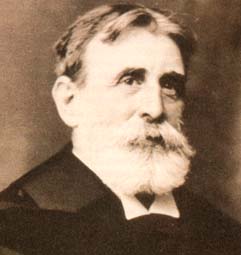 B. B. Warfield
B. B. Warfield
Benjamin Breckinridge Warfield (November 5, 1851 – February 16, 1921) was professor of theology at Princeton Seminary from 1887 to 1921. Some conservative Presbyterians consider him to be the last of the great Princeton theologians.
Kim Riddlebarger posts an excerpt from his dissertation giving an overview of Warfield’s life. Here are a couple of extracts about his marriage:
Soon after marrying Annie Pearce Kinkead, who was also from noble stock, the newlyweds journeyed to Leipzig…
During their stay in Europe an event occurred that would forever change the Warfield’s lives. While walking together in the Harz mountains, Mr. and Mrs. Warfield were caught in a violent thunderstorm. Annie Warfield suffered a severe trauma to her nervous system from which she never fully recovered. She was so severely traumatized that she would spend the rest of her life as an invalid of sorts, becoming increasingly more incapacitated as the years went by. Her husband was to spend the rest of their lives together giving her “his constant attention and care” until her death in 1915 (Allis, “Personal Impressions of Dr Warfield,” 10). B. B. Warfield could not have foreseen just how constant and difficult a demand this was to become, and how, in the providence of God, this would impact his entire career.
. . . Warfield’s remarkable literary output is, no doubt, in large measure due to the frail condition of his wife and his amazing devotion to her. With the pen he was a formidable foe, but as O. T. Allis recalls, “I used to see them walking together and the gentleness of his manner was striking proof of the loving care with which he surrounded her. They had no children. During the years spent at Princeton, he rarely if ever was absent for any length of time” (Allis, “Personal Impressions of Dr Warfield,” 10). Machen recalled that Mrs. Warfield was a brilliant woman and that Dr. Warfield would read to her several hours each day. Machen dimly recalled seeing Mrs. Warfield in her yard a number of years earlier during his own student days, but notes that she had been long since bed-ridden (Stonehouse, J. Gresham Machen, 220).
According to most accounts, Dr. Warfield almost never ventured away from her side for more than two hours at a time. In fact, he left the confines of Princeton only one time during a ten-year period, and that for a trip designed to alleviate his wife’s suffering which ultimately failed (Bamberg, “Our Image of Warfield Must Go,” 229)…
Though Warfield may have been known to many as a tenacious fighter, the compassion he directed toward his wife, Annie Kinkead Warfield, demonstrates a capacity for tenderness and caring that is in its own right quite remarkable. In the mysterious providence of God, it was the nature of his wife’s illness and his devotion to her, that ironically provided the greatest impetus for his massive literary output. Personally vital and energetic, “he did not allow” his wife’s illness “to hinder him in his work. He was intensely active with voice and pen” (Allis, “Personal Impressions of Dr Warfield,” 11). Thus his creative energies were focused in two directions: his writing and the classroom. As caretaker for an invalid wife, Warfield spent many hours each day in the confines of his study.

 Tim Challies comments: I have been reading (and listening to) Tim Keller’s new book The Meaning of Marriage, easily my favorite book of 2011. One of the subjects Keller covers is the lost sense of duty in love. We have come to think that if there is any duty in love it must not be genuine. Biblically, of course, love is shown not in what you receive, but in how much you are willing to give; often you give out of a sense of duty. I’d like to share a quote in which he applies this to the marriage bed. I share this simply because I know what a struggle this is in so many marriages and I am sure that these words can help.
Tim Challies comments: I have been reading (and listening to) Tim Keller’s new book The Meaning of Marriage, easily my favorite book of 2011. One of the subjects Keller covers is the lost sense of duty in love. We have come to think that if there is any duty in love it must not be genuine. Biblically, of course, love is shown not in what you receive, but in how much you are willing to give; often you give out of a sense of duty. I’d like to share a quote in which he applies this to the marriage bed. I share this simply because I know what a struggle this is in so many marriages and I am sure that these words can help.